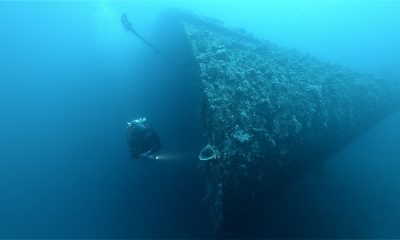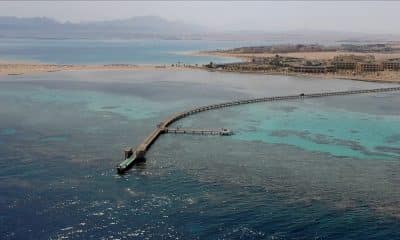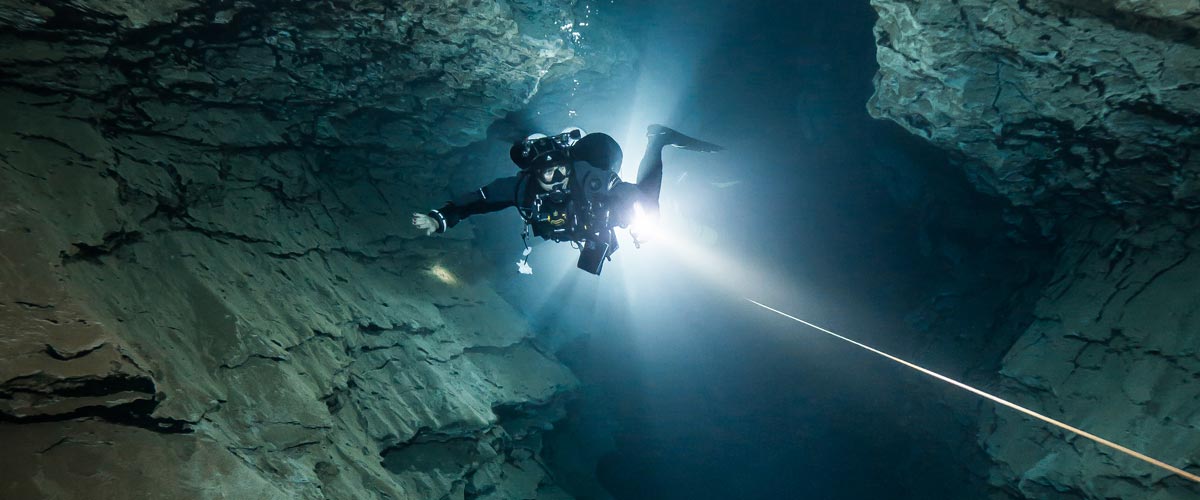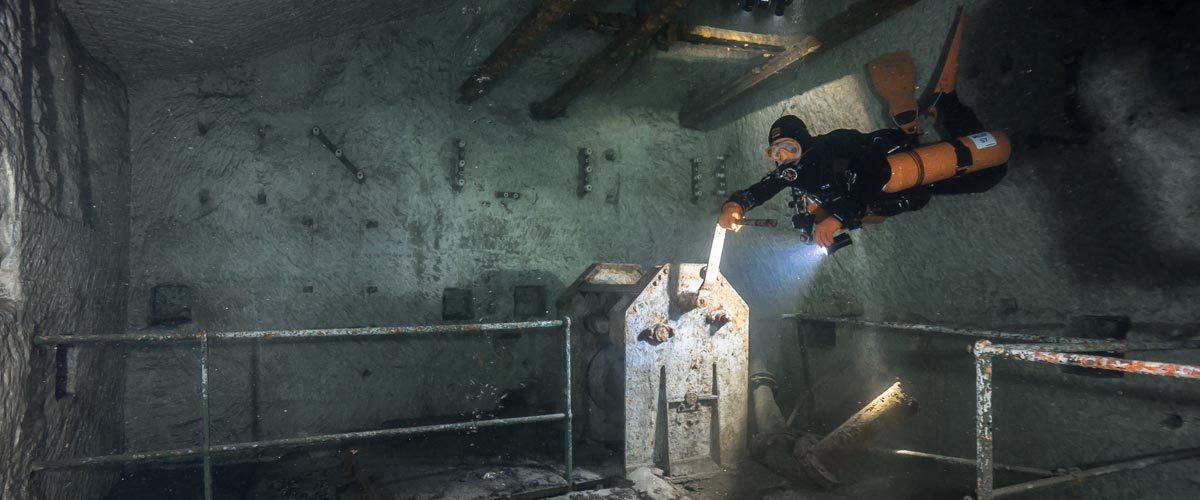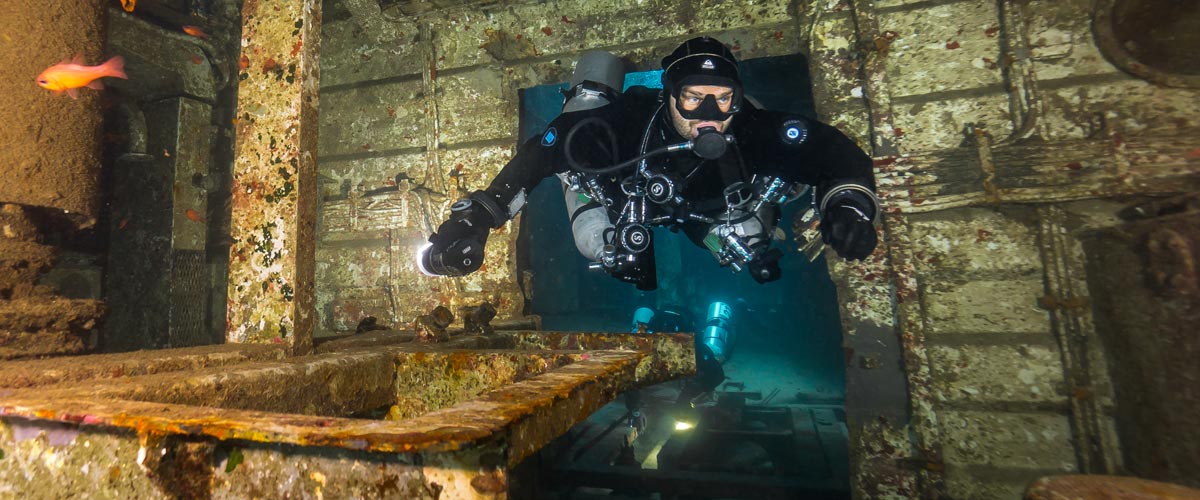Dive Training Blogs
The world would be an even better place with more scuba divers
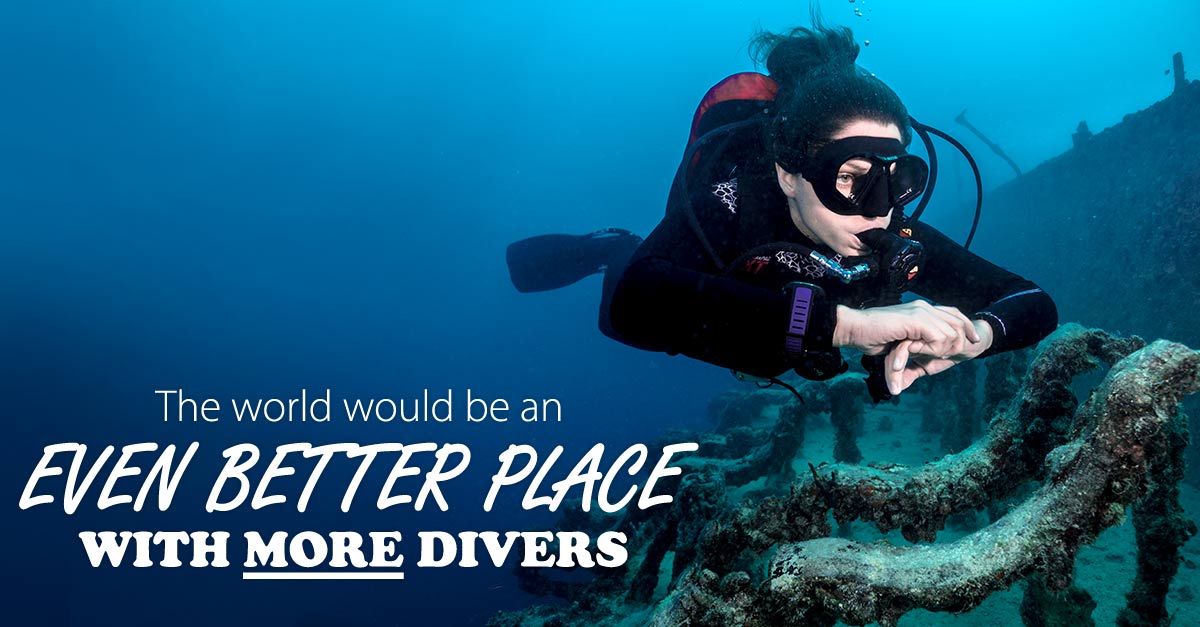
By Joe Stude
Now that’s a bold statement. It’s a twist on The world would be a better place if… rant many of us have heard. You may have used it yourself while inserting our own remedy at the end. The reason I feel scuba divers have such a positive impact on our planet and society is that I have seen it firsthand. This is from a person who is both a recreational diver and someone who has worked in the dive industry for many years.
So just what are these positives that diving brings to the table? Let’s have a look:
- Scuba diving creates a relaxing atmosphere.
- Scuba diving is good for the environment.
- Scuba diving promotes a healthier lifestyle.
- Scuba diving provides a boost to the economy.
- Scuba diving promotes a sense of community
Scuba diving creates a relaxing atmosphere
I begin with relaxation because all you have to do is turn on the news to find stress. I am not going to elaborate on that topic but it I think you see my point.
Our hectic schedules: Hectic schedules can be stress-inducing as well. I can recall a time when my children were school age and we were all home on one Friday evening. I thought that there must be somewhere we were supposed to be. It was not until the next day that we realized we missed an event the night before.
Everyone can use some rest and relaxation time. What better way than on a dive, even if it’s a one-day jaunt to the local dive site?
Cell phones: Now let’s talk about smartphones. Where is yours right now? Mine is right next to me as I write this. My guess is that yours is close by, too. Well, you cannot take your cell phone underwater with you. Actually, you can, but I don’t take calls or surf the web while breathing through my regulator at depth, even if I am using a full face mask. Therefore, diving reduces our screen time. That’s not a bad thing.
Our mind is racing again! Think about where our thoughts are when we dive. When diving, you are actually relaxing (there is that word again), and looking at your surroundings. You are not thinking about what I need to do Wednesday afternoon. Diving just creates time away from the daily grind to recharge.
Dive vacations: Is it possible that just seeing the words dive vacation brings a sense of calm to the moment? It does for me. If you have ever been on a dive vacation you know the amazing feeling of devoting time to explore the wonders of our underwater world for a week. Adding in the resort type atmosphere does not hurt either.
Of course, I realize that some types of diving are not necessarily relaxing. I used to do search and recovery diving so I am well aware of that fact. Those deep wreck dives off the coast of New Jersey did not feel the same as a hammock on a tropical beach. They were still amazing. I also know the feeling of a week in Bonaire. Feel free to insert your favorite dive vacation location in the comments.
Scuba diving is good for the environment
As divers, we learn from the very beginning of our training to be aware of the impact we have on the undersea environment. We also learn how we can avoid damaging this beautiful but fragile ecosystem.
Buoyancy control: We practice our buoyancy control for several reasons. One reason is so that we may look without touching because we learn that just a simple touch can damage delicate sea life.
Shore cleanups: Some divers participate in shore cleanups. There are many who will pick up that soda can during a dive and put it in their catch bag so they can dispose of it properly later.
I can say from experience that when doing a shore dive from a neighborhood access spot, that anxious residents relax when they realize I actually took the time to pick up underwater trash during the dive. When they see me put it in the trash receptacle or in my vehicle to take with me, it goes a long way in helping give divers a good reputation.
Scuba diving promotes a healthier lifestyle
Stop smoking: I do not have any statistics to back this up but personally, but I have seen more people quit smoking as they got into diving than for any other reason.
Exercise: Scuba diving tends to provide that extra incentive some need to get in shape. Those walks back up the hill after amazing dives do not hurt either. It provides exercise as well as the inspiration to exercise more, all at the same time. The dive itself is helping as a physical activity that provides exercise as well.
A Healthy Diet: We learn from the beginning that a healthy diet is beneficial in many ways when scuba diving. The trend is to see more fruit than greasy fried foods when at the dive site.
Scuba diving provides a boost to the economy
Scuba diving creates jobs for those wishing to work in the field. Let’s take a brief look at the industry.
Instruction: It all began with scuba instruction and it continues today. Most divers who really get into diving go on to take additional training past their initial course. This, along with the right equipment, is money well spent. I have never heard a diver say, “I should have bought that new lawnmower instead of my BC.” The same holds true for training. Think safety!
Equipment: Think about what your favorite equipment manufacturer had to do to get you that regulator you really wanted. Obviously, it takes a team of employees ranging from design, engineering, marketing, advertising, sales and more.
Scuba diving promotes a sense of community
Last but not least is the diving community. Whenever someone comes to me for information regarding scuba lessons I always include information about the diving community as part of our meeting.
- I explain that scuba diving is not about competition but about helping each other become better divers.
- I also explain how we can all enjoy the underwater world together.
- I further let them know how exciting it is to meet people from all over the world on a dive trip while sharing one common bond, and about the camaraderie and good times above and below the surface.
Basically, we are all one big extended family.
To find out more about International Training, visit www.tdisdi.com.

Blogs
Intro to Tech: What is it about?
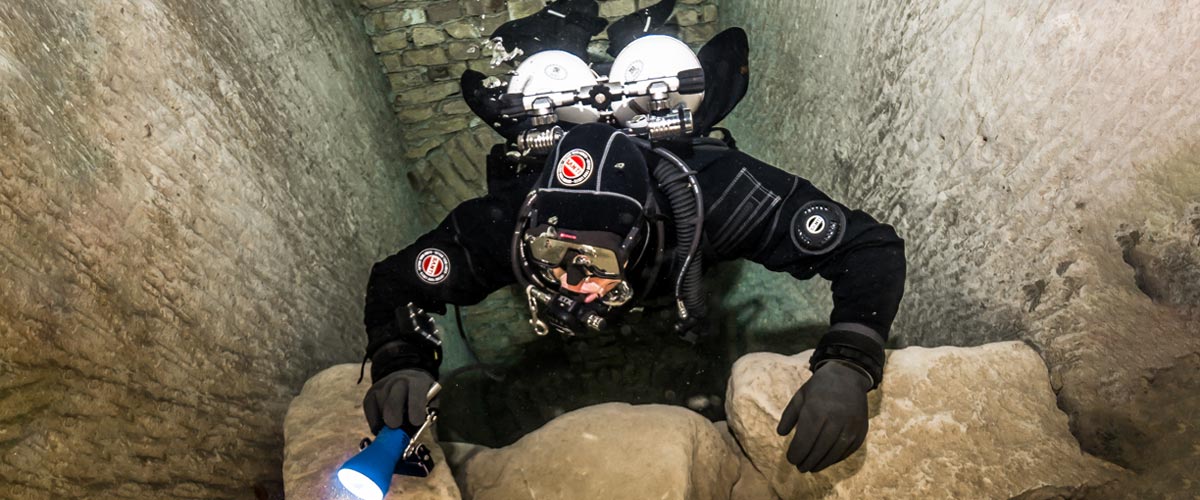
Article by José Pablo Mir
Pictures by Cezary Abramowski
The world of technical diving is exciting. It opens the door to new sites, depths, and bottom times. More importantly, it opens our minds to a new way of planning, facing, and experiencing dives, even those not purely technical.
Becoming a technical diver is a process, and like in other aspects of life, we should find the proper entry point that suits us best based on our knowledge and experience. The Introduction to Technical Diving course from TDI -the world’s largest and most recognized technical diving teaching organization- is the best option for divers who have yet to gain experience in the fundamental aspects of this new practice. The course’s content and its embrace of new techniques and technologies make it possible to acquire a solid foundation to learn and gain experience in this practice properly.
Becoming a technical diver is not something that happens overnight, whether deciding to become one or receiving a certification card stating we are now technical divers. It is a slow process extending farther away than any introductory course. It requires effort and dedication. But it will bring us satisfaction from day one -or two.
It is a matter of mentality
First, we must understand and accept that technical diving, involving greater depths, longer bottom times, exotic gases, virtual or real ceilings, and more, comes with higher levels of risk than the sport diving we have been practicing until now.
Although this discussion usually starts with a warning about risks, as I’ve done in the previous sentence, our practice is not a game of chance.
Technical diving is a rational activity that requires maturity and good judgment, and we will put everything into ensuring that each dive is a successful one -meaning we return from it safe and sound. With this understanding, we will strive to establish a mental attitude more aligned with our practice and its realities.
This new “technical diver” mindset we will develop will lead us to be more cautious in our executions, more analytical in our plans, more rational in our strategies, and more detailed in our procedures.
Experience will keep teaching us to know ourselves better, to keep our anxiety and other emotions under control, and to manage our impulses. Over time, our senses will sharpen, and we will be more attentive to the particulars of the situation we find ourselves in.
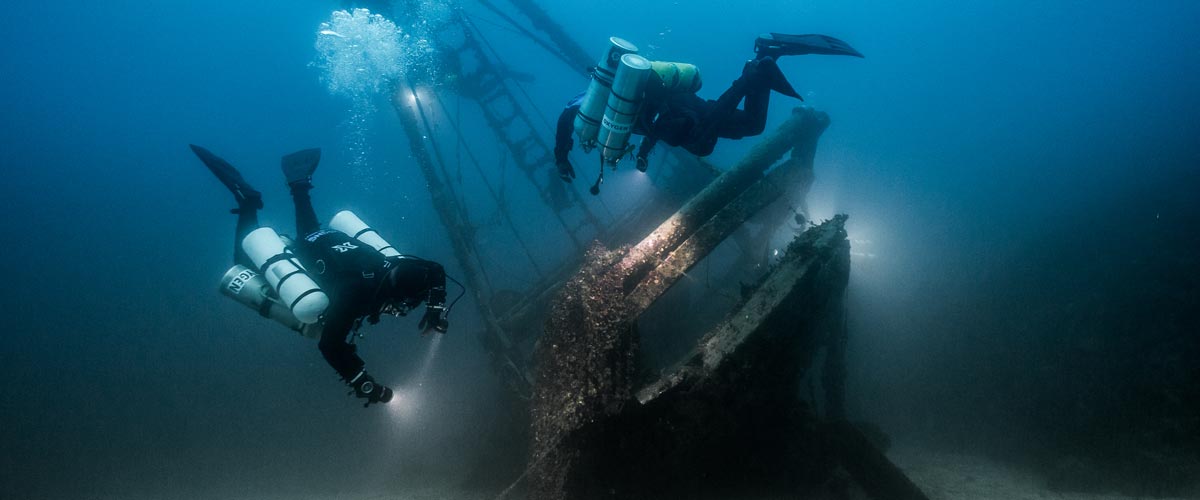
Strategies and procedures
Our strategies, those broad guiding lines tracing the path to follow, from how to approach planning to where, with what, and how we are willing to get there, will be more specific and more practical. Not because they magically become so, but because we will consciously and deliberately frame them that way.
We will establish clear, concise, and realistic procedures. Not only for the undesirable situations that may present themselves but also for those that are part of our dive objectives.
Even though, as technical divers, we often use equipment different from what we were previously accustomed to, it is essential to note that the gear does not make the diver. In a way, we could consider such equipment as the necessary tools to implement what our goal seeks to achieve, according to our strategies and procedures.
Technique plays an important role
We must put our greatest effort into learning and perfecting the different techniques we will be acquiring. Buoyancy, trim, propulsion, cylinder handling, deploying DSMBs and lift bags, valve drills, and more are essential skills we must begin to master to progress in our art. What we cannot do, when we need to do it, can harm us.
Our techniques must be effective and achieve the purpose for which they were devised. But they must also be efficient and require the least resources possible, including the time they take and the effort they demand. Effectiveness and efficiency will prevail over beauty and other considerations that may come to mind, although none of them should be mutually exclusive. A technique executed efficiently and effectively tends to have an inherent beauty.
Refining techniques is a lifelong mission. Some of them will be easy to master from the go; others, on the other hand, will be our life mission and will require many repetitions just to resemble the idea we have in mind of how they should be executed.
We must consider the environment
Our learning, the needs and musts of the practice we engage in, the experience we gradually gain, our strategies and procedures, and even our equipment and tools change with the environment.
Diving in the ocean, everything about us must be suitable for ocean dives. Conditions there rarely emulate those found in a pool, lake, or river. Variable winds and currents, greater depths, visibility conditions, other divers with uncertain skills around us, marine life, maritime traffic, distance from the coast, and many other factors add complexity and uncertainty.
It is never necessary to master the pool on the first day, but planning and aspiring to gradually cope with the ocean’s conditions is essential.
The cost of good training
We are aware that our resources are often scarce in relation to the possibilities of use we could give them if they were not. To a greater or lesser extent, we are part of the economic reality in which we are embedded.
Fortunately, the cost of good technical diver training is not an entry barrier. Comparing training and equipment costs, we see that the former are generally lower. Yes, lower cost for personalized service, essential to our future
performance and safety, than for a series of mass-produced products that are mere, albeit necessary, tools for an end.
The value of good training
The value of the training we received encompasses a range of characteristics, from emotional and methodological to technical and technological. TDI and its Introduction to Technical Diving course offer a deep and modern approach, with a teaching strategy that aims to create thinking divers, not merely obedient ones.
As technical divers, our knowledge is our primary tool. In this type of activity, what we don’t know can harm us.
Is this course optional?
Unfortunately, the fact that this Introduction to Technical Diving course is not a prerequisite for any subsequent training is an invitation to consider it optional. And we all know what usually happens to “optional” under budget constraints.
However, this course should be seen as optional only by those divers who are somehow familiar with the use of technical equipment, who have a mindset more in line with the requirements of this type of diving, who plan and execute the dives the proper “technical” way, who know their gas consumption rate, who are not intimidated by non-decompression tables, who feel comfortable using their dive computers, and know the techniques and have at least an acceptable level of buoyancy, positioning, and propulsion. Those can go straight to a more advanced training course, such as TDI’s Advanced Nitrox.
We must ask ourselves whether or not we are in that group.
Remember our goal: to have fun
Recreational diving is our passion. Jumping into the water carrying heavy equipment and having properly dotted our I’s and crossed our T’s have only one ultimate goal: fun. This is the activity we have chosen as a hobby. We must enjoy it; it must give us pleasure and make us vibrate.
Having a good time is not optional!
Blogs
Four opportunities to go pro in 2024 with Dive Friends Bonaire
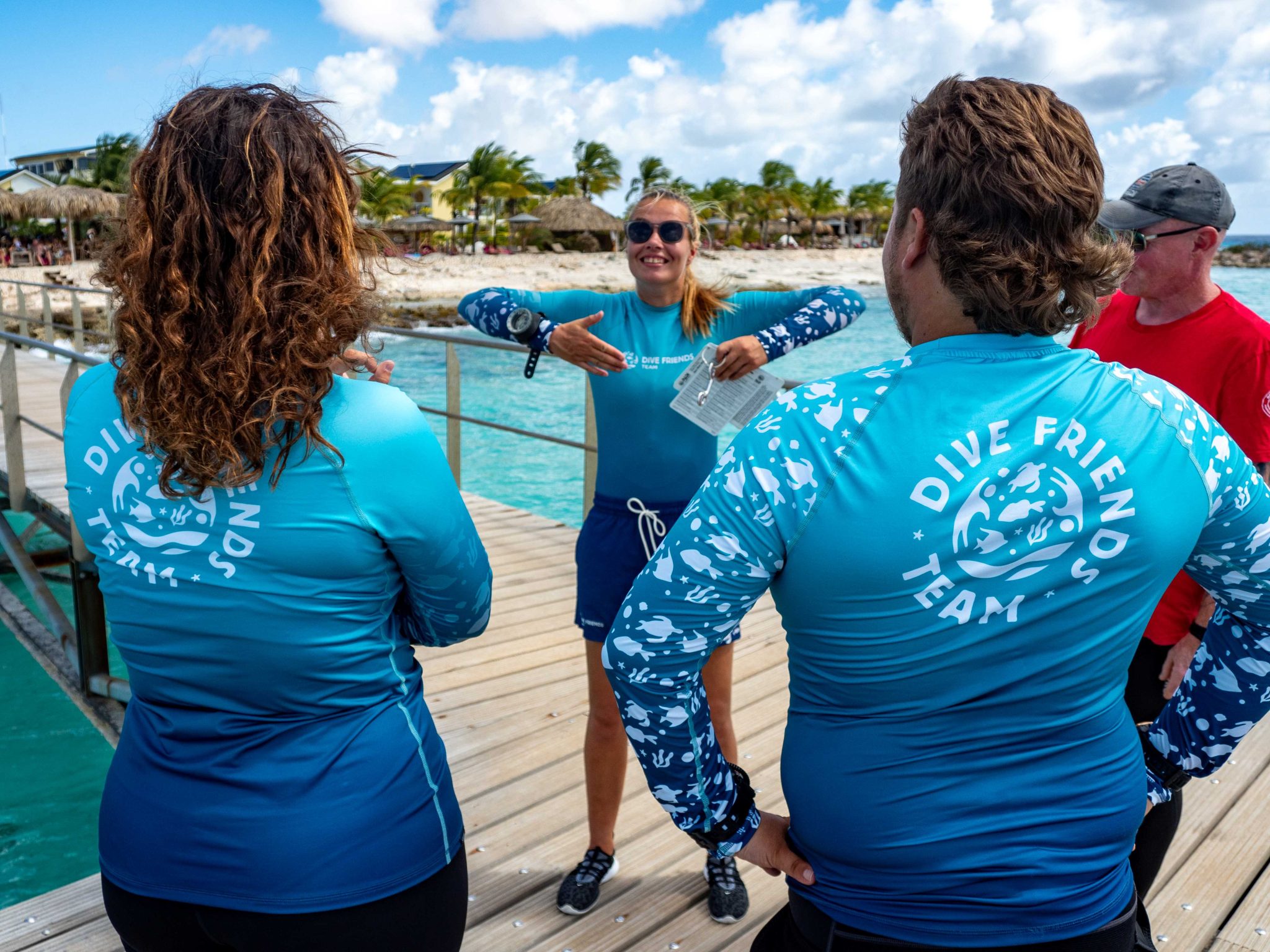
Dive Friends teaches the Instructor Development Course (IDC) several times a year to students who are eager to share their passion for diving with the world.
Dive Friends is known for the personal approach throughout the course. Their in-house course director will lead the students through every essential step, mentoring them to achieve their fullest potential as a dive instructor.
Applications for the following IDC start dates are now open:
- 12 April
- 5 July,
- 20 September
- 29 November
Partnership with Casita Palma
If the student opts for the IDC-Deluxe or IDC-Supreme package, their accommodation will be arranged for them at Casita Palma. This small and quiet resort is within walking distance from Dive Friends Bonaire’s main dive shop location and has everything you need to relax after an intense day of IDC training. Breakfast is included, so the student will always be fuelled and ready for their day.
Contact Dive Friends Bonaire’s Course Director Eddy for more information: coursedirector@divefriendsbonaire.com.
-

 News3 months ago
News3 months agoHone your underwater photography skills with Alphamarine Photography at Red Sea Diving Safari in March
-

 News2 months ago
News2 months agoCapturing Critters in Lembeh Underwater Photography Workshop 2024: Event Roundup
-

 Marine Life & Conservation Blogs2 months ago
Marine Life & Conservation Blogs2 months agoCreature Feature: Swell Sharks
-

 Blogs2 months ago
Blogs2 months agoMurex Resorts: Passport to Paradise!
-

 Blogs2 months ago
Blogs2 months agoDiver Discovering Whale Skeletons Beneath Ice Judged World’s Best Underwater Photograph
-

 Gear News3 months ago
Gear News3 months agoBare X-Mission Drysuit: Ideal for Both Technical and Recreational Divers
-

 Gear Reviews2 months ago
Gear Reviews2 months agoGear Review: Oceanic+ Dive Housing for iPhone
-

 Marine Life & Conservation2 months ago
Marine Life & Conservation2 months agoSave the Manatee Club launches brand new webcams at Silver Springs State Park, Florida











